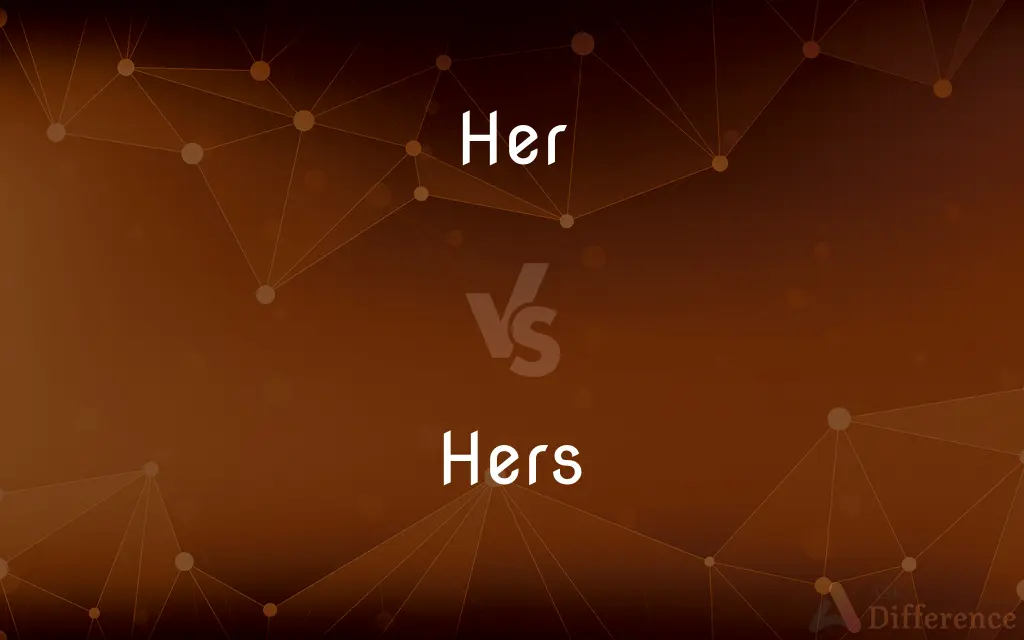Her vs. Hers — What's the Difference?
By Tayyaba Rehman — Updated on September 26, 2023
"Her" is an objective and possessive pronoun, used to describe something belonging to or associated with a female, whereas "hers" is a possessive pronoun denoting ownership by a female.

Difference Between Her and Hers
Table of Contents
ADVERTISEMENT
Key Differences
Her" is a pronoun used in both objective and possessive cases, representing a female person or animal previously mentioned or easily identified. "Hers," on the other hand, is a possessive pronoun indicating that something belongs to her, serving to clarify ownership or possession by a female individual.
When "her" is used, it usually precedes a noun and acts as an adjective, modifying the noun by indicating association or possession with a female. In contrast, "hers" stands alone, replacing both the noun and "her" to avoid redundancy, asserting that the object belongs to the female subject.
Using "her" necessitates the mention of the object it is associated with, as in "her book" or "her idea." Conversely, "hers" eliminates the need to state the object explicitly, as it implicitly conveys possession, as in "The book is hers" or "The idea is hers."
In grammatical terms, "her" is categorized as both an objective and a possessive pronoun, and it often describes to whom something belongs or to whom an action is done. "Hers" exclusively falls into the category of possessive pronouns, emphasizing ownership without requiring the direct mention of the owned object.
In essence, "her" serves to associate a female subject with a noun, requiring the mention of the object in question. "Hers" functions to articulate possession, standing in for both the possessor and the possessed, eliminating the necessity for redundancy in speech and writing.
ADVERTISEMENT
Comparison Chart
Grammatical Role
Objective and Possessive Pronoun
Possessive Pronoun
Noun Requirement
Precedes and requires a noun
Stands alone, replaces noun
Indicates
Association or Possession
Ownership
Use in Sentence
"Her book is on the table."
"The book on the table is hers."
Explicit Object Mention
Requires explicit mention of the object
Does not require explicit mention of the object
Compare with Definitions
Her
May signify possession by a female.
Her book is on the shelf.
Hers
A possessive pronoun, denoting ownership.
The last slice of pizza is hers.
Her
Implies connection or relation to a female.
Her influence is widespread.
Hers
Asserts possession without naming the object.
The choice is hers to make.
Her
An objective pronoun, receiving action.
The teacher praised her for good work.
Hers
Stands alone, replacing both noun and “her”.
The responsibility is hers alone.
Her
A possessive adjective, modifying a noun.
Her performance was outstanding.
Hers
Denotes something belonging to a female.
This office is hers.
Her
Denotes association with a female subject.
Her answer was correct.
Hers
Used to avoid redundancy in sentences.
The fault is hers.
Her
Used as a modifier before a noun
Her boots.
Her accomplishments.
Hers
That which belongs to her; the possessive case of she, used without a following noun.
Her
A female
The dog is a her. See Usage Notes at be, I1.
Hers
Plural of her
Her
Belonging to her (belonging to that female, or in poetic or old-fashioned language that ship, city, season, etc).
This is her book
Her
Belonging to a person of unspecified gender to counterbalance the traditional "his" in this sense.
Her
The form of she used after a preposition, as the object of a verb, or (deprecated) with a conjunction; that woman, that ship, etc.
Give it to her
He wrote her a letter
He treated her for a cold
Him and her went for a walk
Her
(informal) A female person or animal.
I think this bird is a him, but it may be a her.
Her
The form of the objective and the possessive case of the personal pronoun she; as, I saw her with her purse out.
Her
Of them; their.
On here bare knees adown they fall.
Common Curiosities
Can “hers” stand alone in a sentence?
Yes, “hers” can stand alone, as it replaces both the noun and “her,” avoiding redundancy.
Does “her” require a noun to follow it?
Yes, “her” usually precedes and requires a noun, as it often acts as a possessive adjective.
What does “her” represent?
“Her” is a pronoun representing a female person or animal, used in both objective and possessive cases.
Can “her” function as an objective pronoun?
Yes, “her” can also function as an objective pronoun, receiving action in a sentence.
Does “hers” need an explicit mention of the object owned?
No, “hers” does not require an explicit mention of the object as it implicitly conveys possession.
How is “hers” used in a sentence?
“Hers” is used to articulate possession, often standing alone in sentences like “The book is hers.”
Can “her” imply possession by a female?
Yes, “her” can signify possession by a female when used as a possessive adjective, like in “her car.”
How is “her” used in a sentence?
“Her” is used in a sentence to indicate association or possession by a female subject, such as in “her book.”
Can “hers” replace both noun and “her”?
Yes, “hers” can replace both the noun and “her” to indicate ownership by a female subject.
Can “her” be used as a possessive adjective?
Yes, “her” can act as a possessive adjective, modifying a noun to indicate possession or association.
Is “hers” used to avoid redundancy?
Yes, “hers” avoids redundancy by standing in for both the possessor and the possessed object.
What does “hers” represent?
“Hers” is a possessive pronoun indicating that something belongs to a female individual.
Can “her” indicate association with a female subject?
Yes, “her” can denote association, connection, or relation to a female subject.
Does “hers” always denote ownership?
Yes, “hers” is used to assert ownership or possession by a female subject.
Is “her” used as a possessive pronoun?
No, “her” is not a possessive pronoun but can be a possessive adjective or an objective pronoun; “hers” is the possessive pronoun.
Share Your Discovery

Previous Comparison
Emporium vs. Mall
Next Comparison
Accordingly vs. RespectivelyAuthor Spotlight
Written by
Tayyaba RehmanTayyaba Rehman is a distinguished writer, currently serving as a primary contributor to askdifference.com. As a researcher in semantics and etymology, Tayyaba's passion for the complexity of languages and their distinctions has found a perfect home on the platform. Tayyaba delves into the intricacies of language, distinguishing between commonly confused words and phrases, thereby providing clarity for readers worldwide.
















































